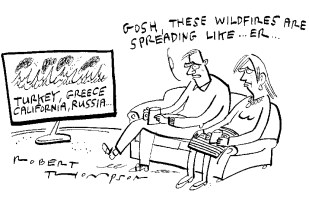Social historians of the future may look back at the reading habits of this era and conclude that we were almost exclusively interested in Nazis and Nordics. Certainly there seems no diminution in these twin tastes. Widowland (Quercus, £14.99) by C.J. Carey (a pseudonym for the writer Jane Thynne) is the latest Nazi-related novel in a crowded field, and its author wisely opts for a different, if not altogether original, conceit. An alternate Britain which lost the war has featured in fiction before — notably in Robert Harris’s Fatherland and Len Deighton’s SS-GB — but even with such celebrated predecessors, Carey more than holds her own. The world of her novel is richly detailed, full of atmosphere and — on the terms of its own make-believe premise — entirely plausible. Write what you know has been responsible for some of the most fatuous books ever composed; Widowland is a stellar example of what can result from writing what you imagine.
The novel is set in 1953, the 13th year since a one-sided armistice has been established with the German regime that now controls all of Europe. Britain is a protectorate, and Hitler’s pet ideologue, Alfred Rosenberg, is the protector. King George and his immediate family have vanished, rumoured to be the victims of a Romanov-like slaughter, and the reinstalled Edward VIII is king, awaiting his own second coronation. An ageing Adolf Hitler is due to arrive on an inaugural visit to the UK.
The book’s protagonist, Rose Ransom, works at the behest of the state, rewriting classics of English literature to reflect a ‘purer’ Aryan ideology, though she is increasingly captivated by the originals she is meant to bowdlerise. War and forced labour have depleted the numbers of men until women outnumber them two to one; yet women are subject to a punitively rigid caste system that makes Margaret Atwood’s hierarchies seem benign. Rose belongs to the highest tier, but even so is obliged to serve as sexual fodder for a senior official she finds repulsive.

When subversive graffiti starts to appear in the days before the coronation, Rose is deputed to track down those responsible. She finds the likeliest suspects among the lowest order of all women: the widows, many of whom live in a run-down compound outside Oxford. Drawn to the dissident, bookish types she meets there, Rose gradually uncovers a conspiracy to sabotage Hitler’s visit, and also finds her own loyalty to the protectorate waning. But informers abound in this alternate Britain, and Rose’s position becomes increasingly perilous as the visit of the ‘leader’ approaches, the clock ticks and tension mounts.
For Nordic buffs comes The Therapist, a striking debut by the Norwegian writer Helene Flood (Quercus, £14.99). Its protagonist (like the author) is a psychotherapist working in Oslo, whose husband, an unsuccessful architect, goes off to meet two pals for a country weekend jaunt. He rings his wife to say he has joined them safely, but later that night one of the friends calls, asking where he is.
When this mysterious disappearance is eventually explained, the novel moves from what has happened to why. At first, Flood’s cast of characters seems slightly stock — the unhappy therapist, the stolid detective — but they come to life the more we see of them, and there is a witch-like mother-in-law Les Dawson would die for.
The usual trappings of the sub-genre are in force: a remote cabin in Norway’s forested wilderness; the not-so-liberal welfare state; and sexual licence, espoused by the therapist’s philosopher father who, surrounded by nubile acolytes, is more predatory charlatan than sage. But a series of frightening ghostlike incidents in the therapist’s house and two clever twists near the end make this debut a striking addition to Norwegian noir.
Genre distinctions may be losing their discriminatory force, especially for thrillers, but faced with 200,000 new titles a year, everybody likes a category. Even very good books get lost, however, because of the industry’s insistence on labels that, paradoxically, are intended to help us find them. It would be a shame if that proved to be the fate of The Fortune Men by Nadifa Mohamed (Viking, £14.99), only a semi-thriller, but an excellent, suspenseful story.
An ageing Adolf Hitler is due to arrive on an inaugural visit to the UK
Set in postwar Cardiff near the docks, it portrays a world of such stunning variety that it reminds us that British diversity did not begin last year. Along with the Welsh, the story presents us with an almost bewildering array of races and nationalities. Mahmood, the protagonist, is a Somalian immigrant who has worked on cargo ships all over the world but has settled in Wales after marrying a local girl. He’s a quick talker, borderline hustler, gambler and petty thief; and when a local Jewish shopkeeper is murdered in an aborted robbery, he becomes a police suspect, too, based on the testimony of another even less reliable chancer.
As the case unfolds, and Mahmood is brought to trial, he remains unworried, firm in his belief that the charges against him are dismissable nonsense. Readers waiting for the mandatory plot surprise may be waiting still, but the strength of this story comes from the depictions of its polyglot characters and unusual setting. The author seems able to bring visual life to anything, from Cardiff street celebrations of Eid — with ‘aproned matrons, flat-capped gamblers, ruined rummies, yapping dogs, fresh-faced bar girls and leather-jacketed teenage delinquents’ — to Mahmood’s memories of life in Somalia, where his ‘town settled into a sun-baked, soundless, cud-chewing torpor: the rough roads empty apart from black and white goats’.This is too good a book to fall between the cracks.
Finally, this year marks the 50th anniversary of the publication of The Day of the Jackal, the famed thriller by Frederick Forsyth about an aborted assassination attempt on Charles de Gaulle. A celebratory edition (Arrow, £8.99) comes with a generous and perceptive foreword by Lee Child, which may surprise those who confuse the formulaic nature of his books with artlessness, forgetting that it was he, after all, who created the formula. As Child notes, the surprising tension of a novel whose ending we already know results from the author’s focus not on the what or why of his story but the how. The Day of the Jackal is not so much well written as brilliantly reported — a tour de force with legs.






Comments